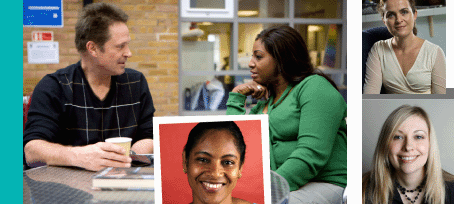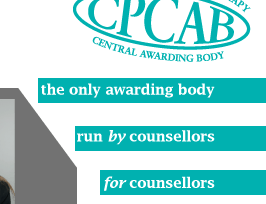


Client: ‘my wife treats me like a dog!’
Counsellor: ‘come and sit down, and tell me about it ...’
Client: ‘I can't! I'm not allowed on the furniture!’
Counsellor: “I've no idea what your problem is. I think it must be drink-related ...”
Client: “OK - I’ll come back when you're sober.”
If you no longer wish to be included in our Student Update mailing list please respond to clare@cpcab.co.uk with the word "UNSUBSCRIBE" as the email's subject.
Our best wishes go to all CPCAB students, new and old, at the start of another new academic year. If you’re new to CPCAB qualifications, this may be the first time you’ve seen our ‘Student Update’ e-magazine. It’s your very own version of the regular newsletter we send to tutors at our registered centres and is designed to keep you up to date with developments in the world of counselling (and hopefully make you smile at the same time). If you’d like to contribute to the next ‘Student Update’ we’d like to hear from you, at update@cpcab.co.uk.
Open University module D171 - Introduction to Counselling
At CPCAB head office we’re receiving lots of enquiries from students interested in working towards the joint CPCAB/Open University foundation degree.
As you’ll know if you’ve gone through the details on either the CPCAB or the OU website, it’s possible to substitute the OU’s module D171 for our own Level 3 Certificate in Counselling Studies when working towards the CPCAB Level 4 Diploma in Therapeutic Counselling. For some of you this may be a useful option, perhaps saving travelling costs, possibly saving time too as you can work on D171 at the same time as your college-based level 2 counselling skills studies.
Of course we hope you’ll choose our own counselling studies qualification though! And working in a group of like-minded students can give you a good start to your diploma training if you meet up again with old friends. But if you’d like to consider D171 (or have already completed it) and your Diploma training centre isn’t clear about this option, we’re very happy for them to contact us for confirmation.
CPCAB/Open University joint foundation degree: for details click here or here.
New Horizons - important consultation by the Dept of Health
The Department of Health is currently engaged in a "New Horizons" mental health consultation. We recommend both tutors and trainees read the consultation document and complete the associated questionnaire.
Closing date: 15 October 2009
Where to find it on the web: www.dh.gov.uk/en/Healthcare/Mentalhealth/NewHorizons/
The DoH vision for 2020
By 2020, we hope that:
- everyone will understand why good mental health is important and know what to do to help their own mental health
- children will be taught in school about how to protect their mental health
- a person’s physical health and their mental health will be equally important to health services
- people with mental health problems and their families will be able to get all the high quality support they need
- medicines will be better and have fewer side effects
- people with mental health problems will not be treated differently just because of their problems
- mental health services will make special plans that give people a bigger say in what their treatment is and how they get treatment
- older people with mental health problems will be treated with the same respect as younger people
- people from ethnic minorities with mental health problems will get the treatment they need, in a way that suits them
- different services will work well together to give the best possible care
- people who cannot work because of mental health problems will be able to do other things that help them to be part of their community
- people with mental health problems will not have more health problems than other people. For example they will not be more likely to smoke, to be overweight or to have heart problems
- we will understand why poor people are more likely to have mental health problems
- other parts of government will think about the needs of people with mental health problems when planning things like: housing, education or transport.